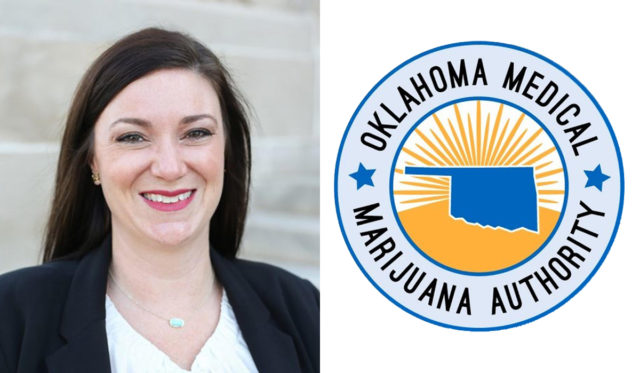(Update: This article was updated at 3:35 p.m. Wednesday, Aug. 18, to include comment from Kelly Williams, Gov. Kevin Stitt and to clarify language related to the OMMA director position. It was updated again at 4:13 p.m. after OMMA staff confirmed Williams would remain with the agency in a different position. It was updated a final time at 4:40 p.m. to include an additional quote from Berry.)
Another transition in leadership is underway for the Oklahoma Medical Marijuana Authority, with Oklahoma Petroleum Alliance senior vice president Adria Berry being named OMMA director to succeed Dr. Kelly Williams.
“I am committed to tackling the major challenges that the explosion of marijuana in Oklahoma is causing across our state,” Gov. Kevin Stitt said in a press release distributed shortly after the publication of this story. “Foreign nationals are gobbling up land in rural communities and drug traffickers are exploiting our laws and threatening our public safety. Adria Berry is the right leader to help us solve these problems and protect Oklahomans.”
According to a statement distributed after the publication of this article, Williams will “continue to work with the agency, providing her expertise and guidance” after Berry becomes director Aug. 30.
“I am appreciative of the credentials and experience that Ms. Berry brings to the agency,” Williams said in the statement.
Stitt’s communications director declined to comment about the circumstances of the change, and Williams name did not appear in the governor’s press release.
Williams became interim OMMA director in the summer of 2020 and was later officially named director in February after being promoted by Oklahoma State Department of Health Commissioner Lance Frye.
Berry will be the fourth OMMA director since State Question 788 legalized medical marijuana in 2018. In a statement provided to NonDoc, she praised OMMA staff and said she is eager to join the state agency.
“I’m honored and looking forward to working for citizens across Oklahoma who have been patient as the OMMA worked to get its bearings after the passage of SQ 788 legalized medical marijuana in Oklahoma,” Berry said. “The staff at OMMA has worked tirelessly to address issues as they arise, and I’m eager to join the team and work along-side them to continue solving problems and implementing sound policy for all Oklahomans.”
After this article was updated to note that Williams was remaining with the agency, Berry sent NonDoc an additional statement.
“Kelly and I are talking about her position within the OMMA,” Berry said. “She is committed to a successful and smooth transition of the director position and the success of the OMMA.”
In prior job, Berry questioned aspects of SQ 788
From 2017 to 2019, Berry served as vice president of government affairs for the State Chamber of Oklahoma. When SQ 788 was on the ballot in 2018, Berry supported efforts to craft additional guidelines around medical marijuana, particularly as it related to employer and employee rights.
She outlined concerns during an Edmond forum covered by KOCO, and she also critiqued SQ 788 as having “overly broad language” in a commentary published on NonDoc.
“While 30 states and the District of Columbia have legalized the use of marijuana in some form, this particular state question does not put Oklahoma on an even playing field owing to its poorly worded and overly broad language,” Berry wrote in 2018. “Allowing individuals to possess copious amount of marijuana to consume and grow has left many of us in the business community dazed and confused.”
In the commentary, Berry discussed the question’s language with regard to who would be allowed to have access to medical marijuana.
“By permitting anyone with any medical condition to receive a medical marijuana license allowing them to possess and grow a large amount of marijuana, we are opening up our state to a largely unregulated young industry,” she wrote. “Some level of regulation and quality control is necessary when dealing with medicine — prescription or not. Why should medical marijuana be treated differently?”
In the commentary, Berry acknowledged the medical benefits of marijuana.
RELATED
Legislators, law enforcement focused on black market marijuana and rural concerns by Matt Patterson
“We do not want to ignore empirical data showing cannabis can be an effective medication for people with many illnesses. And, with the opioid crisis in our state, it’s worth noting there is evidence that cannabis may act as an alternative to opioids in some situations,” she wrote. “It’s important, however, to carefully analyze all potential impacts of SQ 788 as it was written.”
In the three years since SQ 788 was approved with nearly 57 percent support from voters, the Oklahoma Legislature has passed several adjustments and additional regulations to the medical marijuana program.
Most recently, marijuana industry leaders and lawmakers have been expressing concerns about black-market marijuana grow operations that have frustrated legitimate business owners.
Seed to sale lawsuit ongoing
Follow NonDoc on:
Williams’ departure comes as the OMMA struggles to implement its seed-to-sale program, which would allow for the agency to track marijuana plants from the time they are planted until they are processed and sold to consumers.
But seed-to-sale has been stalled because of a lawsuit filed by cannabis growers earlier this year. Some growers have objection to the requirement in the program that they purchase RFID tags exclusively from Metrc, which is the state’s vendor for the tracking system.
Rep. Scott Fetgatter (R-Okmulgee) said in March he had concerns about the requirement to purchase the tags exclusively from Metrc.
“Seed-to-sale tracking is definitely needed, and Metrc is good at what they do,” he said. “It’s more about the RFID tag and the requirement that people buy their tags that I was concerned about. There were no options other than to buy their tags, which kind of monopolizes their company [when we] force our marijuana producers to buy tags only from them.”
(Editor’s note: Tres Savage contributed to this report.)























